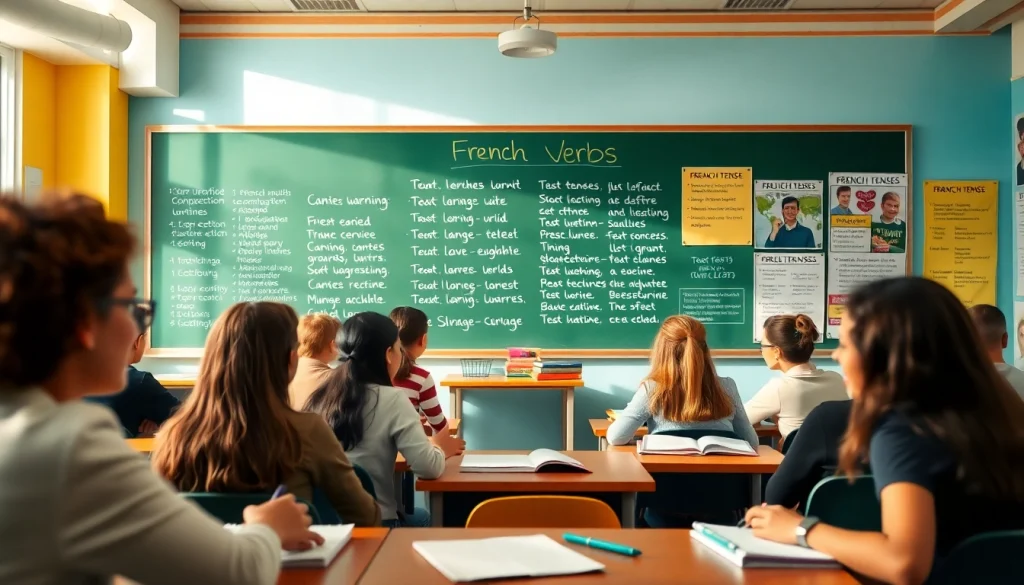Mastering French Verbs: A Comprehensive Guide to Conjugation and Usage

An Introduction to French Verbs
Learning French can be a rewarding experience, but one of the biggest challenges for learners is mastering French Verbs. Understanding how verbs function is essential to communicating effectively in French. This article will serve as a comprehensive guide, exploring the various types of French verbs, their conjugation styles, and their practical applications in daily conversations.
Understanding the Basics of French Verbs
In French, verbs are action words that express what the subject of a sentence is doing. The French language includes a rich variety of verbs that can be classified into different categories based on their actions, usages, and conjugation patterns. A basic understanding of these distinctions is crucial for learners to form grammatically correct sentences.
Every French verb belongs to one of three main groups based on how they conjugate:
- First Group: Regular verbs ending in -er (e.g., parler – to speak).
- Second Group: Regular verbs ending in -ir (e.g., finir – to finish).
- Third Group: Irregular verbs, which do not follow a consistent conjugation pattern (e.g., être – to be, avoir – to have).
The Importance of Conjugation
Conjugation is the process of modifying a verb to indicate various aspects such as tense, mood, and the subject performing the action. In French, conjugation alters the verb’s form based on the subject pronoun (je, tu, il, elle, nous, vous, ils, elles), the tense (present, past, future), and the mood (indicative, subjunctive, imperative). Failure to properly conjugate verbs can lead to misunderstandings or grammatically incorrect sentences. Hence, mastering conjugation is paramount for successful communication in French.
Regular vs. Irregular French Verbs
French verbs are broadly categorized into regular and irregular verbs. Regular verbs follow predictable patterns during conjugation, making them easier for learners to manage. In contrast, irregular verbs deviate from these patterns, requiring learners to memorize their unique forms. Some of the most essential irregular verbs include être, avoir, aller, and faire. Understanding the distinction between these two types of verbs is foundational for progressing in French language proficiency.
Common French Verbs to Know
Top 20 Frequently Used French Verbs
Familiarity with common French verbs will significantly enhance your conversation skills. Here are the top 20 frequently used French Verbs you should know:
- être – to be
- avoir – to have
- faire – to do/make
- aller – to go
- dire – to say/tell
- voir – to see
- savoir – to know
- pouvoir – to be able to/can
- vouloir – to want
- venir – to come
- prendre – to take
- donner – to give
- parler – to speak
- mettre – to put
- prendre – to understand
- maigrir – to lose weight
- finir – to finish
- laisser – to leave/let
- trouver – to find
- demander – to ask
- répondre – to respond
Usage of Common French Verbs in Daily Conversations
Knowing these verbs is not enough; understanding how they function in everyday conversations is equally important. Contextual usage can provide insight into verb forms, nuanced meanings, and idiomatic expressions. For example:
- Être: “Je suis étudiant” (I am a student).
- Avoir: “Tu as un ordinateur?” (Do you have a computer?).
- Faire: “Nous faisons du sport” (We do sports).
In each instance, the choice of verb directly impacts the meaning of the sentence. Therefore, practice using these common verbs in conversations to automate their usage.
Synonyms and Antonyms of Core French Verbs
Expanding your vocabulary with synonyms and antonyms can significantly enhance your comprehension and expressive abilities in French. Here are some examples:
- Être (to be): Synonyms include “devenir” (to become) and “exister” (to exist). Antonym: “ne pas être” (not to be).
- Avoir (to have): Synonyms include “posséder” (to possess) and “détenir” (to hold). Antonym: “ne pas avoir” (not to have).
- Faire (to do/make): Synonyms include “effectuer” (to carry out) and “créer” (to create). Antonym: “ne pas faire” (not to do).
By learning the synonyms and antonyms of these verbs, you can convey different shades of meaning and participate more dynamically in conversations.
Conjugation Techniques for French Verbs
Mastering Present Tense Conjugation
The present tense is used for actions currently happening or habitual actions. Regular verbs in the present tense are typically straightforward to conjugate. For example:
- Parler (to speak):
- Je parle (I speak)
- Tu parles (You speak)
- Il/Elle parle (He/She speaks)
- Nous parlons (We speak)
- Vous parlez (You speak)
- Ils/Elles parlent (They speak)
- Finir (to finish):
- Je finis (I finish)
- Tu finis (You finish)
- Il/Elle finit (He/She finishes)
- Nous finissons (We finish)
- Vous finissez (You finish)
- Ils/Elles finissent (They finish)
Irregular verbs require special attention, as their conjugation forms can be less predictable. Creating flashcards or utilizing conjugation apps can significantly aid in mastering these forms.
Conjugating French Verbs in the Past Tense
The past tense in French, known as the passé composé, is frequently used to talk about events that have been completed. It consists of two parts: the auxiliary verb (avoir or être) and the past participle. For example:
- Avoir (to have):
- J’ai eu (I had)
- Tu as eu (You had)
- Être (to be):
- Je suis allé(e) (I went)
- Tu es allé(e) (You went)
The choice between avoir and être often depends on the main verb being used. Regular practice with typical past participles will streamline your ability to convey past events.
Understanding Future Tense Forms of French Verbs
The future tense conveys actions that will take place at a later time. There are primarily two forms to express future actions: the simple future and the near future (futur proche). For example:
- Simple Future: “Je parlerai” (I will speak).
- Near Future: “Je vais parler” (I am going to speak).
Understanding the distinction and application of these forms helps in discussing future intentions effectively. Being able to shift between them can add depth to conversations.
Challenges in Learning French Verbs
Common Mistakes with French Verbs
Even with dedicated study, learners often encounter challenges with French verbs. Some common mistakes include:
- Incorrect conjugation of irregular verbs.
- Mixing up auxiliary verbs (avoir vs. être).
- Forgetting to agree the past participle with the subject when using être.
Recognizing these pitfalls is the first step to overcoming them. Consistent practice, possibly with a study group or tutor, can improve understanding and retention.
How to Overcome Conjugation Confusion
To conquer conjugation confusion, consider leveraging a range of strategies:
- Break verbs into smaller parts and focus on one conjugation form at a time.
- Use music or videos in French to hear verbs in context.
- Practice with language-learning partners to imitate real-life conversations.
Each strategy encourages active participation, thereby enhancing the retention of verb forms and their uses.
Resources for Practicing French Verbs
There are numerous resources available for practicing French verbs effectively:
- Conjugation Apps: Utilize apps that specialize in conjugating French verbs and offer quizzes for practice.
- Online Courses: Enroll in structured courses that emphasize verb usage and conjugation.
- Flashcards: Create flashcards for each of the French verbs you are learning, helping memorize various forms.
Investing time into these resources will pay dividends in securing a solid command of French verbs.
Enhancing Your Vocabulary of French Verbs
Expanding Your Knowledge with Advanced French Verbs
As you progress, it becomes crucial to expand your vocabulary beyond common verbs. Advanced and nuanced verbs enrich your linguistic expression:
- Acquérir: to acquire
- Éprouver: to experience
- Innover: to innovate
Incorporating these into your speech or writing will make your communication more sophisticated and precise.
Listening and Speaking Practice with French Verbs
Active listening and speaking are two pillars of mastering any language. Engage with French media, such as films, podcasts, and songs, that heavily feature verbs in action. This will not only develop your ear for the language but also enhance your verbal skills.
Consider mimicking dialogues or participating in language exchange meet-ups to practice using verbs in real-time conversations.
Using Technology to Learn French Verbs
In today’s digital age, technology is a fantastic cheat sheet for learning French verbs. Consider the following resources:
- Language Learning Platforms: Platforms like Duolingo or Rosetta Stone offer structured lessons focusing on verbs and conjugation.
- Online Forums: Join online communities dedicated to learning French—these are great for sharing resources, tips, and even engaging in practice.
Technology can often offer a level of engagement and interactivity that traditional study methods lack, fostering both retention and enjoyment of learning.







